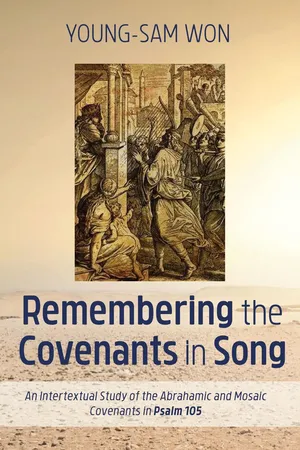![]()
1
Studying the Covenants
Then and Now
A Historical Survey of Covenant Studies: Following Two Streams
The history of covenant scholarship is not linear but complex. In broad strokes, the analogy of a river comes to mind—a river that splits into major tributaries that run in parallel at times and occasionally intersect as they meander independently through their respective fields. While the biblical covenants have long been a subject of scholarly interest in theological and biblical studies, the manner in which scholars have approached this topic has varied depending on which “stream” of scholarship they followed and at which point in history they produced their work. One can view the river as the main movement of biblical scholarship that followed the Reformation. This tradition of OT studies eventually bifurcates into two major tributaries of scholarly tradition. In the modern era, the epoch-making influence of higher criticism and a shift in focus toward the history of Israelite religion would define the major branch that forms mainstream OT scholarship and the evangelical stream of scholarship can be considered the tributary. This survey, while not exhaustive, highlights the major developments, movements, and trends that have come to characterize the modern study of OT covenants.
Wellhausen and the Modern Era
In many ways, the modern approach to biblical scholarship came of age in the wake of Wellhausen’s epoch-making work Prolegomena to the History of Israelite Religion. The prominence of Wellhausen’s approach marked the point at which mainstream OT scholarship went from a theological endeavor to an emphasis on modern historicism. With the wide acceptance of Wellhausen’s work, the source-critical approach to OT texts would affect every aspect of biblical studies, including the modern approach to the biblical covenants.
According to Wellhausen’s view of Israelite religion, the earliest period of development reflected a primitive naturalistic religion that later evolved into the ethical religion of the prophets and finally culminated in the legalistic religion overseen by the Deuteronomic and Priestly schools. In the framework of Wellhausen’s history of Israelite religion, the covenants are literary fictions produced by the Deuteronomic and Priestly schools to support a particular narrative of Israel’s ancient history.
In concert with the ascendance of source criticism was an emphasis on historicism in studying the OT, which seemed to better accommodate the Hebrew writings in their existential and historical setting. During this time, scholars gravitated toward four issues with regard to covenant in the OT: (1) the historicity of the journey to Sinai; (2) the meaning of the term berit; (3) the nature of early Israelite religion; amd (4) the silence of the eighth-century prophets regarding berit. The question of historicity in OT narratives and the dearth of covenant references in the eighth-century prophets bolstered the late dating of the covenant concept to the time of Josianic reform.
According to Nicholson, this period from Wellhausen to the end of the nineteenth century is characterized by a general scholarly consensus regarding the late date of the covenants in the last stage of Israel’s religious development. Thus, the covenants were seen as juridical, legalistic documents reflective of Deuteronomic and Priestly concerns. Mainstream OT scholarship became less interested in the individual biblical covenants and more interested in the concept of covenant. The view that the biblical covenant texts were late examples of historical fiction meant the covenants were mainly of value as a means of understanding the various religious schools and tradents who were active in the exilic and postexilic periods. The theological significance of the covenants was no longer of importance as scholars began to study covenant from an evolutionary and rationalistic perspective.
Beyond Wellhausen: Finding Consensus
In the early part of the twentieth century, mainstream OT scholarship experienced a noticeable shift from historical-critical emphases toward sociological and phenomenological approaches. During this period, Wellhausen’s view of covenant fell out of favor as several simultaneous developments brought the biblical covenant traditions back to the earliest period of Israel’s history. Max Weber’s Ancient Judaism, a seminal sociological study of ancient Israel’s religion and society, contributed to this major shift in thinking regarding covenant in Israel. Though it was Weber who first suggested that there were “amphictyonic” tendencies in Israel’s early rituals, Martin Noth ultimately popularized the view that the pre-monarchic tribes of Israel formed a confederation according to the analogy of Greek “amphictyonies.”
Weber viewed t...
